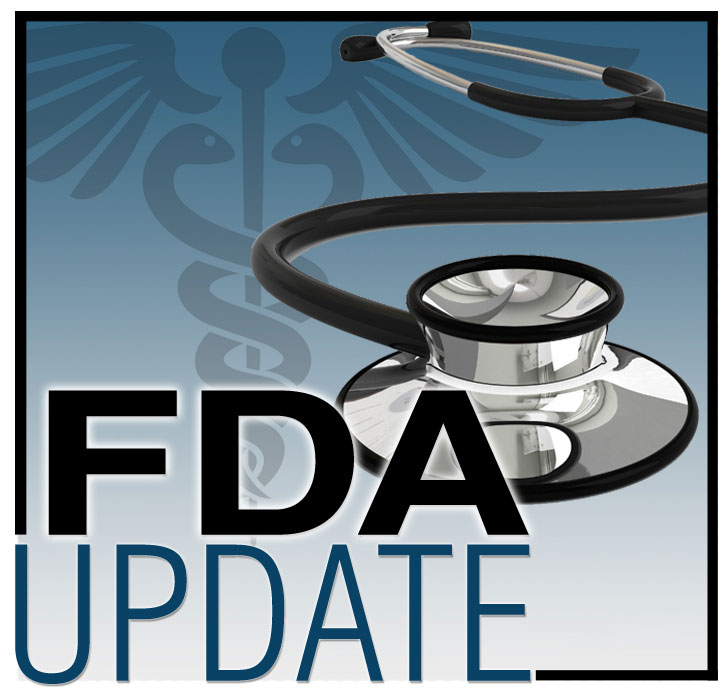FDA Approves Olaparib for Germline BRCA-Mutated Metastatic Breast Cancer

On January 12, 2018, the U.S. Food and Drug Administration (FDA) granted regular approval to olaparib tablets (Lynparza®), a poly (ADP-ribose) polymerase (PARP) inhibitor, for the treatment of patients with deleterious or suspected deleterious germline BRCA-mutated (gBRCAm), HER2-negative metastatic breast cancer who have been treated with chemotherapy either in the neoadjuvant, adjuvant, or metastatic setting.
This is the first FDA-approved treatment for patients with gBRCAm HER2-negative metastatic breast cancer. Patients with hormone receptor (HR)-positive breast cancer should have been treated with a prior endocrine therapy or be considered inappropriate for endocrine treatment. Patients must be selected for therapy based on an FDA-approved companion diagnostic for olaparib.
Approval was based on data from OlympiAD (NCT02000622), an open-label, multi-center clinical trial that randomized 302 patients with gBRCAm, HER2-negative metastatic breast cancer (2:1) to olaparib 300 mg orally twice daily or physician’s choice of chemotherapy (capecitabine, vinorelbine, or eribulin). All patients had to have a known deleterious or suspected deleterious gBRCA mutation and must have received prior chemotherapy in the neoadjuvant, adjuvant, or metastatic setting to be randomized. Randomization was stratified by prior use of chemotherapy for metastatic disease, hormone receptor status (hormone receptor-positive vs. triple-negative), and previous use of platinum-based chemotherapy. The primary efficacy outcome was progression-free survival (PFS) assessed by blinded independent central review (BICR). Estimated median PFS was 7.0 and 4.2 months in the olaparib and chemotherapy arms, respectively (HR 0.58, 95% CI: 0.43, 0.80; p=0.0009).
The most common adverse reactions reported in at least 20% of patients taking olaparib in clinical trials were anemia, nausea, fatigue (including asthenia), vomiting, neutropenia, leukopenia, nasopharyngitis/upper respiratory tract infection/influenza, respiratory tract infection, diarrhea, arthralgia/myalgia, dysgeusia, headache, dyspepsia, decreased appetite, constipation, and stomatitis.
FDA also granted marketing authorization for the BRACAnalysis CDx® test (Myriad Genetic Laboratories, Inc.) for use as an aid in identifying patients with breast cancer with deleterious or suspected deleterious gBRCAm who may be eligible for olaparib. The effectiveness of the BRACAnalysis CDx® test was established based on the OlympiAD trial population for whom deleterious or suspected deleterious gBRCAm status was confirmed with prospective or retrospective testing with the BRACAnalysis CDx® test.
The recommended dose of olaparib is 300 mg (two 150 mg tablets) taken orally twice daily with or without food. Full prescribing information is available (https://www.accessdata.fda.gov/drugsatfda_docs/label/2018/208558s001lbl.pdf).
FDA granted priority review to olaparib for this application. A description of FDA expedited programs is in the Guidance for Industry: Expedited Programs for Serious Conditions-Drugs and Biologics (http://www.fda.gov/downloads/drugs/guidancecomplianceregulatoryinformation/guidances/ucm358301.pdf).
Healthcare professionals should report all serious adverse events suspected to be associated with the use of any medicine and device to FDA’s MedWatch Reporting System by completing a form online (http://www.fda.gov/medwatch/report.htm), by faxing (1-800-FDA-0178) or mailing the postage-paid address form provided online, or by telephone (1-800-FDA-1088).
Follow the Oncology Center of Excellence on Twitter @FDAOncology (http://www.twitter.com/@fdaoncology).
Check out recent approvals at the OCE’s podcast (http://www.fda.gov/DISCO), Drug Information Soundcast in Clinical Oncology (DISCO).
In collaboration with the FDA and as a service to our members, ONS provides updates on recent FDA approvals and other important FDA actions (e.g., updated safety information, new prescribing information) pertaining to therapies for patients with cancer. This allows the agency to inform oncologists and professionals in oncology-related fields in a timely manner. Included in the FDA updates is a link to the product label or to other sites for additional relevant clinical information. In supplying this information, ONS does not endorse any product or therapy and does not take any position on the safety or efficacy of the product or therapy described.
